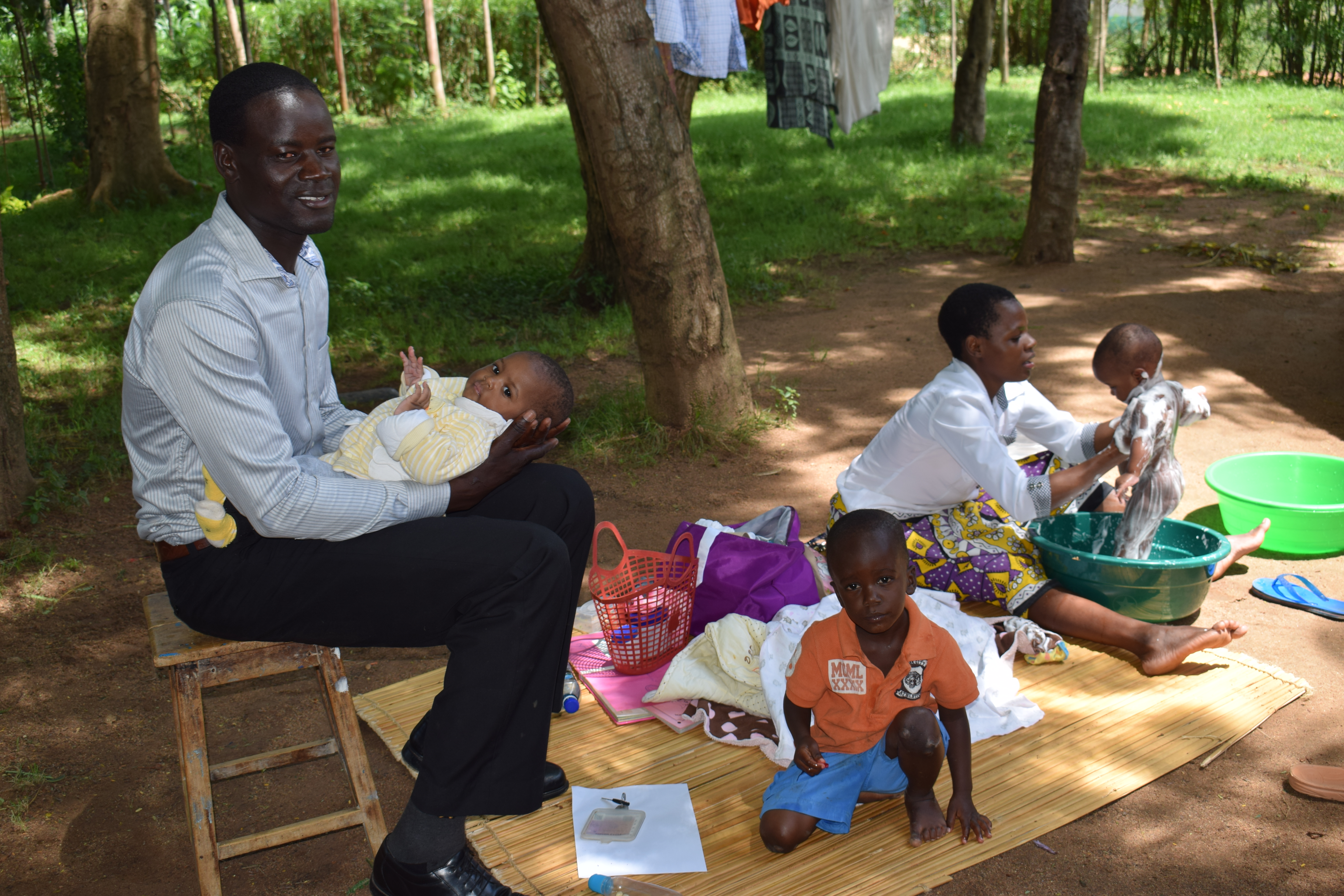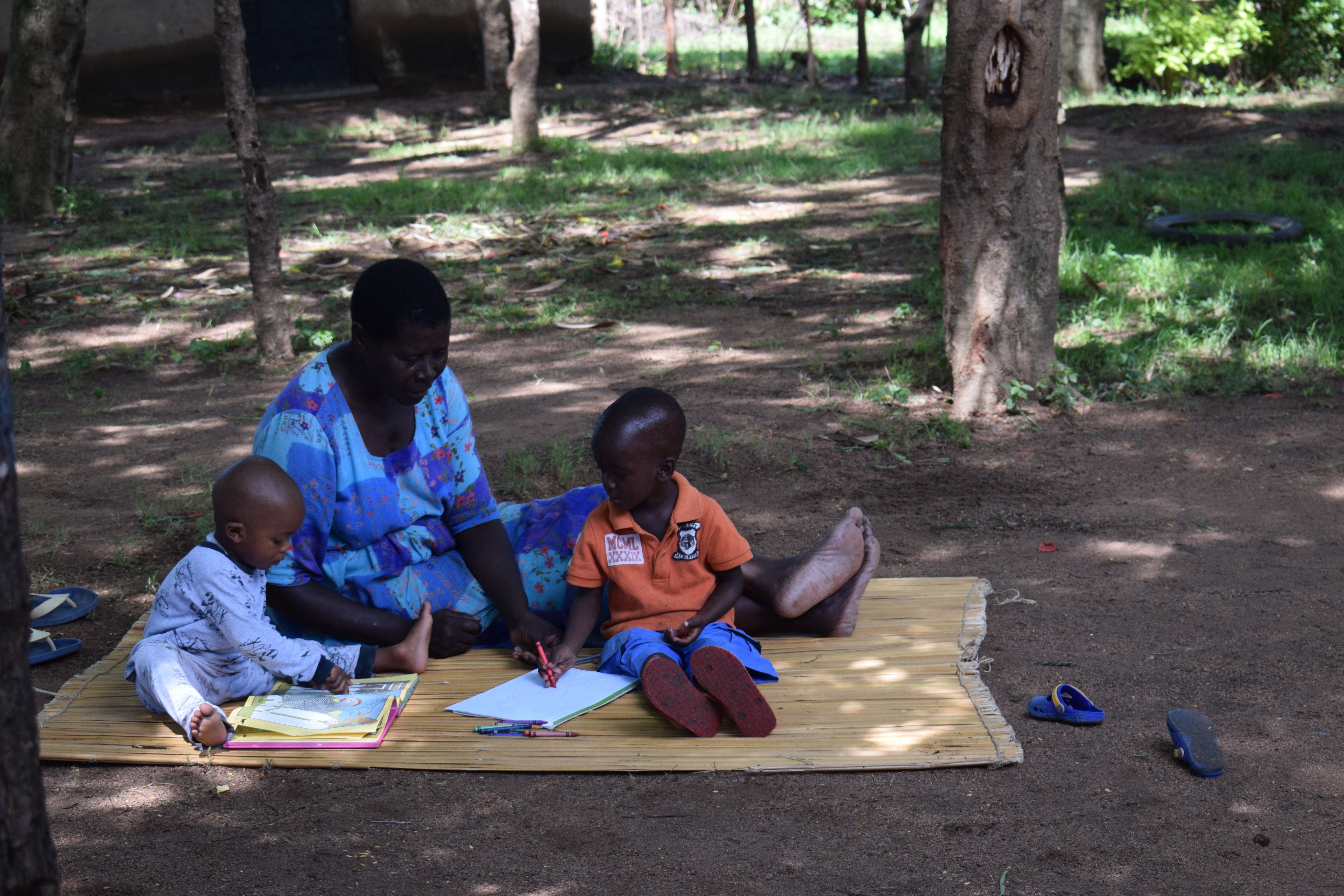KENYA: Catholic Relief Service’s SCORE ECD Program Turns Couple’s Life Around

Erick Omondi Otieno holds Baby Samantha as Emma bathes Natalie
A young couple in Siaya County in Western Kenya has had their life turned around after fully embracing Early Childhood Development (ECD) interventions.
Erick Omondi Otieno and Emma Adhiambo who are beneficiaries of the programme are parents to two six months old twin girls – Samantha and Natalie and three-year-old Tony Blair Graham.
Through the (CRS) coordinated Strengthening the Capacity of Women Religious in Early Childhood Development (SCORE ECD) programme, nuns help families understand the importance of nutrition, breastfeeding and communicating early and effectively with their children.
According to the CRS Regional SCORE ECD Coordinator, Sr. Pauline Silver Acayo, the project is being implemented with funding from Conrad N. Hilton Foundation. She said CRS is implementing the project through the Association of Consecrated Women in Eastern and Central Africa (ACWECA) and three national Associations of Sisters within the ACWECA region.
“Catholic Relief Services works in partnership with 18 congregations in Kenya, Malawi and Zambia with the aim of helping children under the age of two to thrive in a sustainable culture of care and support,” she further explained.
The Franciscan Sisters of St. Ann (FSSA) at Lwak in Siaya County where the couple lives are part of nine Sisters’ congregations implementing the SCORE ECD project in Kenya.
“The sisters together with community health volunteers educate women on the importance of responsive care giving,” the CRS SCORE ECD Regional Coordinator said.
She explained that the training was aimed at giving the women knowledge and skills in nutrition, early stimulation, positive parenting, exclusive breastfeeding, antenatal and postnatal care and hygiene.
Women are encouraged to play and communicate with their children to enable them reach their developmental milestone and provide them early learning opportunity.

cousin take time learn and draw pictures
under the tutorship of their grandmother.
Otieno, who is himself a primary school teacher, also in his free time helps the little boy to learn using picture charts to stimulate his cognition. Since Emma joined the neighbour women group for the Integrated Mothers and Babies Course and ECD programme about a year ago, a lot has changed for the couple. “Today, hygiene in our home is of high standard,” Otieno observed.
The father of three is particularly impressed with the keenness with which his wife now handles issues of hygiene. “Hygiene in our home was moderately low and the children’s soiled clothes took long before being washed,” he said.
But after becoming part of the ECD programme, he noted that his wife became a promoter of ECD interventions in the family and the neighbourhood. “Personally I have been won over and I have no problem helping with some of the house chores,” he said, adding that he can now fry eggs and prepare a simple meal for the children.
Further on, Otieno says he often uses his free time to play with children, bathe them or simply look after them when his wife is tired or busy with other chores.
Otieno who is now contented with the positive change in his family and the respect that this has commanded in the community said his peers see him as a point of reference.
“We have a lot of friends with whom we gladly share the importance of responsive care giving, personal hygiene, nutrition, play and communication and, a good number of them have changed,” he said.
But what surprised him most was when his wife told him that one could communicate with an unborn baby in the mother’s womb. “You know I am a stubborn man and I couldn’t simply accept that unborn children are able to respond to any communication directed at them in their mothers’ womb,” he recalled.
So for a while Otieno refused to communicate with his unborn babies. But after some convincing from his wife, he reluctantly began touching his wife’s womb whenever he returned from school. He made the same sound whenever he stroked his wife’s womb, and was surprised that the unborn babies responded by kicking their mother’s womb.
And when the babies were born, Otieno was shocked to note that they instantly recognised his voice when he made that sound. From then on, Otieno became very keen on the wellbeing of his children. He plays, bathes and feeds the children whenever his wife is busy or they simply feed or bathe the babies together.
He said the parental involvement has created a strong bond between them and their children. Not surprisingly, the couple’s relationship has greatly improved. “We are able to understand each other and if there are problems, we resolve them amicably,” he said.
More so, the family’s diet has also improved greatly. “We have a kitchen garden and are able to provide a balanced diet for our family and this has greatly impacted the mother’s diet helping with the production of breast milk for the babies. “Now our children rarely fall sick – they are alert, healthy and eager to play and communicate with us,” he said.
~End~
By Sr. Grace candiru, MSMMC


